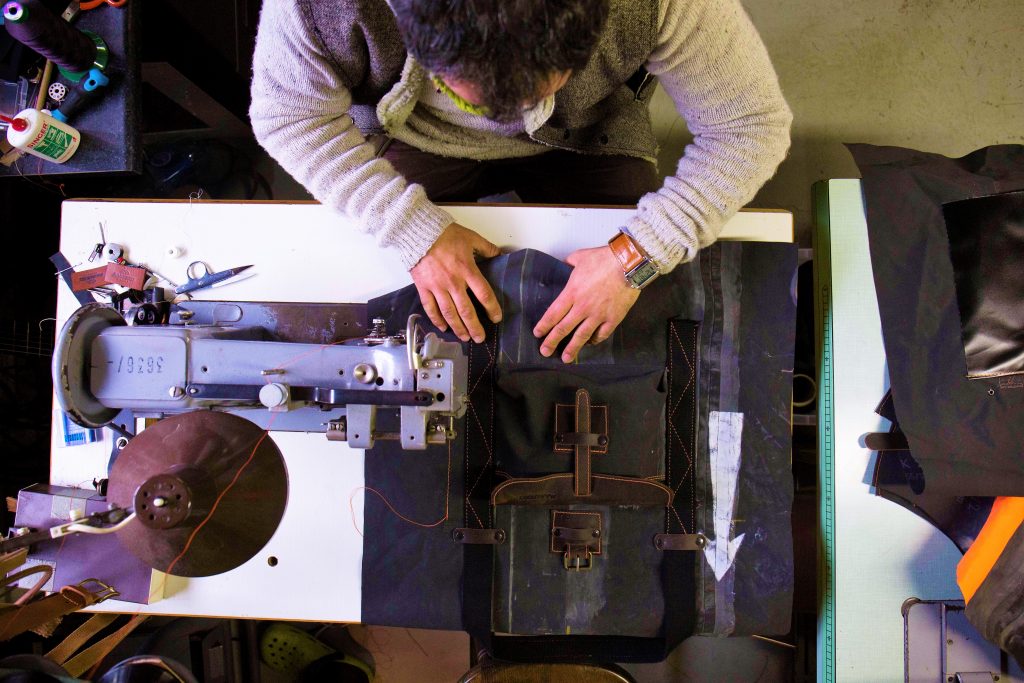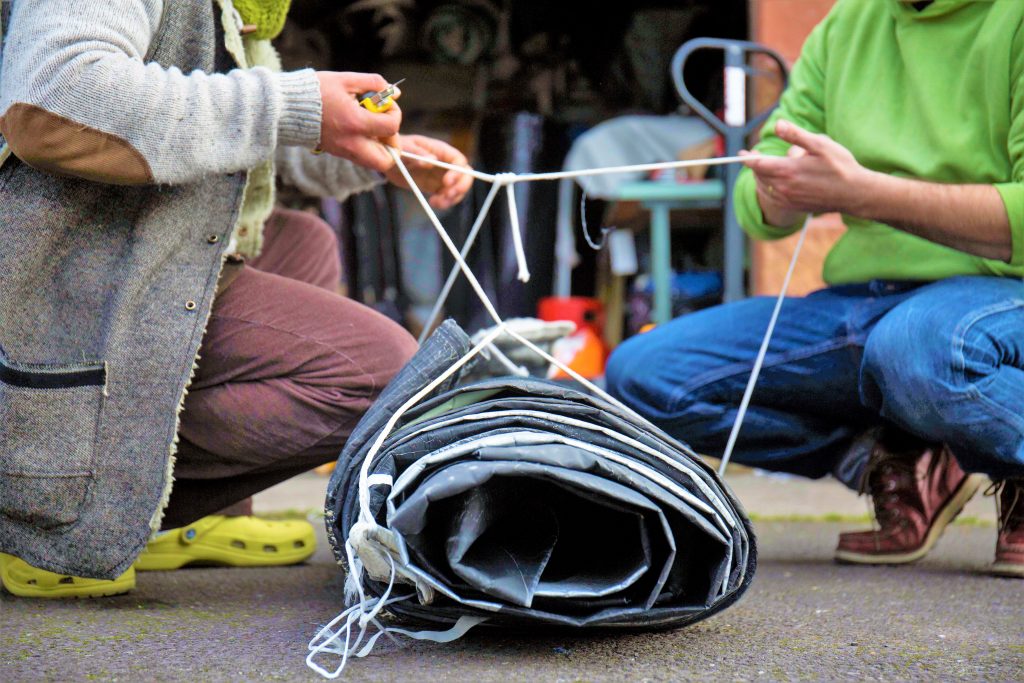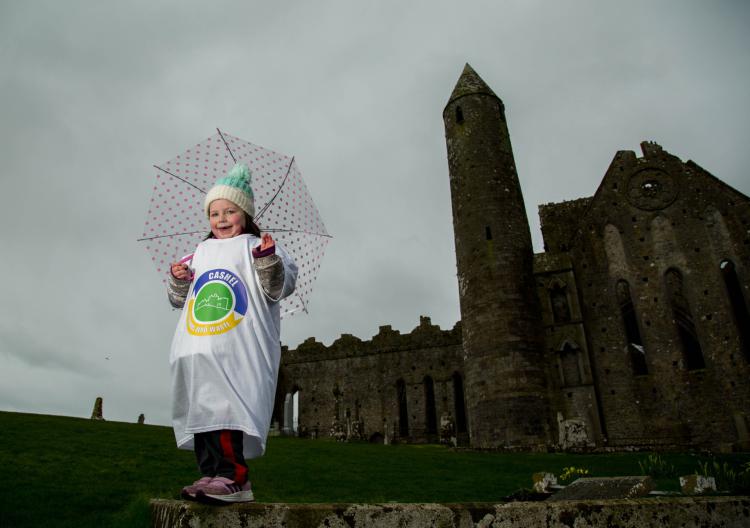The Mamukko Brothers: An eco-conscious upcycling revolution

November 15th, 2017
In 2007, the financial crisis hit Hungary as hard as it did on our own little island.
While hundreds of thousands left the emerald isle in search of pastures new in the wake of the crash, many also came to Ireland in search of their own fresh start.
This group includes the Hungarian designer duo, Attila and Levente Magyar.
Although the brothers heard charming stories about Dublin, they instead chose Kinsale as the perfect spot to take a chance on plans to create an innovative and eco-friendly brand.
The deciding factor says Levente: a ready availability of sailcloth fabrics.

Mamukko Studio Kinsale Co. Cork Ireland Photo; Clare Keogh
The Mamukko Brand
Today, the Hungarian brothers provide the four pairs of expert hands behind Mamukko, the eco-conscious company specialising in designing bags out of recycled sailcloth and upcycled life rafts.
Recycled fabrics are now found in every corner of the brothers’ small studio, awaiting their turn under the sewing machines. “We are very passionate about the fabrics,” Attila says.
The Mamukko brothers have brought the skills of traditional leather craftsmanship inherited from their parents to create beautiful eco-friendly bags, wallets, and stylish purses.
The brothers became the first in their family of generations of leather-crafters to rebel against this conventional form of design.
Attila and Levente’s father, who taught them to sew and make bags, did not approve of his sons’ eco-conscious designs at first.
“When our father came over and touched the fabric he said ‘sailcloth is no good for making bags, let’s buy leather and make nice products,’” Levente says laughing.
“After a few years, he changed, and he likes these fabrics now,” Levente adds, with their father now seeing the value in their unique brand.
Today, Mamukko remains the only company in the world to make fashionable bags out of upcycled life rafts (Google ‘upcycled life raft bags’ and Mamukko will dominate your search results).
The success of the company has led Cork City Council to reach out to the creative duo and commission them to make bags for the guests at a UNESCO conference in Cork this year.

Mamukko Studio Kinsale Co. Cork Ireland Photo: Clare Keogh
Environmental Impact
For the Mamukko brothers, the sewing machine is their environmental weapon of choice.
Although the idea of lowering their environmental impact was not the initial motivation behind the creation of their brand, interest in creating an eco-conscious product grew stronger over time.
“It was very common for the young generations of designers in Budapest to use recycled fabrics, so it was very natural for us to do it too,” Levente says.
The term Upcycling was coined by German automation engineer Reiner Pilz and means giving higher values to old products instead of throwing them away.
While upcycling promotes sustainable innovation and creativity, the principle also has numerous environmental advantages.
For example, it is estimated that every ton of abandoned textiles that are used again can prevent 20 tons of CO2 from re-entering the environment.
Upcycling also has a significant impact on the minimisation of waste that is going to landfill, and in this case, potentially into our seas and oceans.
The Food and Agriculture Organisation states that stranded, missing or deserted fishing equipment make up for 10 per cent (640,000 tonnes) of all marine litter.
Abandoned or lost fishing equipment can also lead to a phenomenon known as “ghost -fishing” where sea creatures such as turtles, seabirds, and other marine mammals get trapped.
Environmental experts believe that an abandoned gillnet can proceed to fish on its own for months – if not years.

Mamukko Studio Kinsale Co. Cork Ireland Photo: Clare Keogh
Eco-Affordability
A 2015 Nielsen global report showed a significant gap between the percentage of consumers willing to buy eco-friendly products (26 per cent) and those who actually purchased them (10 per cent). The same report revealed that this 10 per cent mostly belonged to the affluent classes of society.
A quick look at Mamukko prices may put the stylish and unique brand out of the reach of some, however, Attila is very quick to defend their rates.
“They are original, limited edition, made in Ireland products,” Attila says, with each product possessing its own unique history.
Each Mamukko bag, for example, holds a unique serial number hand-stamped or stitched into the bag.
The stitched-in labels are made from upcycled sailcloth and hold the serial the batch number and the fabrics used to make the bag as well.
“What we have achieved has a value that increases its price, if these bags were out-sourced and manufactured in China, they would be cheaper, but we make them with our hands one by one,” Attila says passionately.
“If somebody appreciates eco-consciousness and originality they would buy our products,” he says.
Attila and Levente say that their bags are not expensive compared to similar products in the US and other markets. Also, the brothers offer repair services to their customers.
Asked if they are leading a profitable business, the brothers give their own definition of the word ‘profit’.
“What is profit? If we can recycle and make products out of the things that are going to the bin, then it is something good for everybody, that is our profit,” Levente says.
If we agree to go by the brothers’ definition, then Mamukko is one of the most profitable companies in the world.
By Shamim Malekmian
Shamim is a Cork-based freelance journalist and contributor to the Irish Examiner, Cork’s Evening Echo and Green News. She is also currently a second-year BA in Journalism student at Griffith College Cork.





